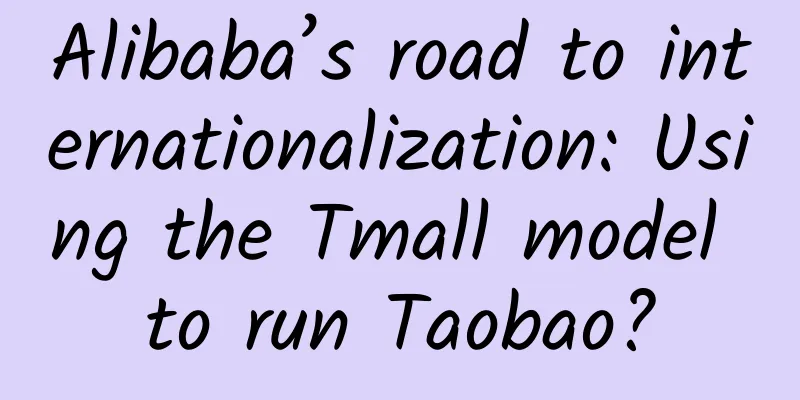Alibaba’s road to internationalization: Using the Tmall model to run Taobao?

|
Recently, there is news that Alibaba's cross-border e-commerce platform AliExpress will launch a new seller service rating system, and will give sellers different platform resources based on the new ratings. The rules it has formulated are exactly the same as Taobao's: the core criterion for determining whether a seller is "excellent, good, qualified, or unqualified" is the "buyer's bad experience order rate." To put it bluntly, it means that sellers should not have bad reviews and try not to have disputes with buyers. Next is the "carrot and stick" support policy: the highest-level "excellent sellers" can obtain the most platform resources, for example, buyers can quickly find excellent sellers when searching for products and choose to place orders for excellent sellers' products. Sellers with poor performance indicators will receive fewer or even no platform resources. For example, sellers who are judged to be "unqualified" will not be able to register for platform activities, and their search ranking will be affected to varying degrees. In my opinion, AliExpress’s policy is the same as Taobao’s. Bad reviews will become more and more important, and even a bad review will determine the seller’s business. Combined with AliExpress’s sales structure of cheap goods, high-quality imitations and even fakes, and the fact that sellers generally provide free shipping, AliExpress is becoming a B2C Taobao for the international market. To be honest, I finally understood Alibaba's internationalization strategy and the real meaning of Jack Ma's statement in an interview: "Internationalization does not mean having business abroad." Of course, it is not difficult to see that AliExpress is becoming more and more like Taobao, and it is even obvious. However, the code of Alibaba's business logic and the essence of its business model architecture are hidden behind AliExpress's adoption of the Taobao model. Although Alibaba's Taobao model is an e-commerce platform, it is essentially an online commercial real estate model. It does not sell goods itself, and the services it can provide are limited. Its profit model can only be achieved through sellers' transaction volume and advertising. Specifically, Taobao uses advertising and keywords as its main means of revenue, while Tmall and AliExpress mainly achieve revenue through transaction commissions and technical service fees. Therefore, the control of traffic and the right to formulate seller rules can be said to be the key to Alibaba's Taobao model to build a business model. As for what to sell and to which consumers, it is actually not an issue that Alibaba's business logic needs to focus on. Therefore, we can see the unique business scene presented by AliExpress: in terms of platform model, AliExpress is more like Tmall, a typical B2C merchant store model, theoretically more inclined to regular brand manufacturers and retailers with certain strength. But in terms of product structure, it is more like entering the world of Taobao, where cheap goods with price first and quality second are popular, high-quality imitations have become the mainstream, and fakes are difficult to ban. Some people say that the reason why AliExpress has formed such a commodity ecosystem is that consumers in emerging countries such as Russia and Brazil who are price-sensitive and prefer cost-effective products are the mainstream buyer group of AliExpress. However, I hope everyone can think more deeply about why e-commerce platforms such as eBay have not formed such an ecosystem when facing the same consumer groups in the same countries? Why did Alibaba transform from Taobao to Tmall in China, where there are also many consumers who love cheap goods? E-commerce Jun believes that the issue of consumer groups is a very external business logic level for Alibaba. It can be adjusted at any time according to changes in the market situation, but its internal logic drive remains unchanged, which is to direct all platform traffic to places with higher output, rather than simply adapting to changes in consumer groups. Take Tmall as an example. Alibaba chooses regular brands and powerful retailers, abandons small sellers and lets them "fend for themselves" on Taobao. The main starting point is not that domestic consumers have begun to have higher requirements for product quality, but that these sellers can also offer more commissions and advertising fees while attracting mainstream buyers. Why not? Similarly, AliExpress does not focus on which type of sellers to support based on product quality, but on the revenue potential that can be brought by their sales strength and business scale. As for whether the goods sold are genuine, fake, good or inferior, as long as buyers are willing to place orders, Alibaba does not care whether the business ecosystem formed by the platform is good or bad. How to have continuous traffic (buyers) and how to support high-output and low-cost "taxpayers" (sellers) are the issues that Alibaba really cares about. The business model of AliExpress can be described as Alibaba's international replica and improvement of Taobao and Tmall. Here, Alibaba will still play the role of law enforcer who occupies the moral high ground, using endless rules and high-sounding reasons such as fairness, safety, and credit to carry out "survival of the fittest" among sellers. Sellers who need to improve their reputation will do so, those who need to increase orders will do so (although the cost is a bit higher), those who need to "take a taxi" (buy through train ads) will still have to take a taxi, and those who need to sell high-end imitations and fakes will still have to sell them. Once consumer demand changes, AliExpress will simply replace a group of sellers. Whether the product structure is low-end or high-end, and the quality of the products is good or bad, or genuine or fake, will not have a real impact on both ends of the scale of Alibaba's business model. So, what is the key to subverting Alibaba's business model? The key is the sellers themselves. Most of Alibaba's mainstream sellers are manufacturing small and medium-sized enterprises and individual merchants in China's Yangtze River Delta and Pearl River Delta. Their own channel expansion capabilities are extremely insufficient, so they urgently need e-commerce platforms like Taobao to engage in e-commerce business. At the same time, these merchants' eagerness to get rich and their indifference to business ethical rules have enabled Alibaba to quickly build an online hypermarket with rich goods and broad rent-seeking space through the dual methods of winning over and suppressing. Since almost all of Alibaba's policies are formulated for sellers, as long as consumers do not worry about buying counterfeit goods, e-commerce platforms like Taobao can indeed be called a "paradise" for consumers. For this reason, as long as Alibaba can drive tens of thousands of small and medium-sized businesses in mainland China to log on to its own platform to set up stores and sell goods, and as long as these goods can attract enough consumers, then this market will be suitable for Alibaba's business model. Therefore, the existing model of AliExpress came into being. The seller group is still the same group of people, but the consumers have become foreigners who are greedy for cheap and easy-to-use products. Some foreign sellers even regard AliExpress as a purchase channel for their business on eBay. I don’t know if you readers understand what Jack Ma meant by “internationalization does not mean having business overseas”, but I seem to have understood it. As a winner of Toutiao's Qingyun Plan and Baijiahao's Bai+ Plan, the 2019 Baidu Digital Author of the Year, the Baijiahao's Most Popular Author in the Technology Field, the 2019 Sogou Technology and Culture Author, and the 2021 Baijiahao Quarterly Influential Creator, he has won many awards, including the 2013 Sohu Best Industry Media Person, the 2015 China New Media Entrepreneurship Competition Beijing Third Place, the 2015 Guangmang Experience Award, the 2015 China New Media Entrepreneurship Competition Finals Third Place, and the 2018 Baidu Dynamic Annual Powerful Celebrity. |
<<: iPod is on the decline. Can smart speakers take over?
>>: Exploring the dual-face of broadcasting and television: conservative industry promoters
Recommend
Should nails be cut into round or square shapes? How short should they be cut? I didn’t expect there are so many things to know about nail cutting
Cut your nails Different people have different cu...
4 copywriting skills to turn users’ NO into YES!
The user's decision-making process is never a...
South Korea's IBK Economic Research Institute: If the United States imposes a 25% tariff on imported cars, South Korea's auto exports may decrease by 18.59%
U.S. President Donald Trump announced a 25% tarif...
All robots men want can satisfy artificial intelligence or have entered a legal blind spot
Artificial intelligence is nothing new. The term w...
How to become a "low-altitude hero"? You can't just fly if you want to!
Let’s talk about the “traffic rules” of the low-a...
Operational list for private domain traffic diversion on TikTok!
The article is short and only contains essential ...
Why doesn't the iPhone 7 Plus telephoto lens work in low light?
This year's dual-camera upgrade to the iPhone ...
A bright star seen in the Southern Hemisphere reveals an ancient collision in the Milky Way
A bright star in the cluster, visible from the So...
7 aspects that a complete operation plan should include
Operations are basically a process of constantly ...
Disease control experts remind: Pay attention to these common infectious diseases on campus in spring!
Recently, children have bid farewell to their win...
90% of people don’t know how to do user research. Do you?
Do you really understand user research? Can you d...
Should I eat less meat if my blood lipids are elevated? Is this true?
Some people mistakenly believe that high blood li...
How to use AED and seize the golden 4 minutes of "sudden death rescue"?
On the evening of June 30, a young athlete from t...
The ultimate showdown of portable Bluetooth speakers: Sony SRS-XB20 and JBL compete to see who wins
Portable Bluetooth speakers are still an emerging...
How to use Toutiao's recommendation rules to create a hit article with over 1 million readers? (10,000 words of dry goods)
Toutiao has been able to become a disruptor in th...









